
International Survey of Speech-Language Pathologists’
If you are a caregiver of a person with Autism Spectrum Disorder (ASD), you may have wondered about your therapists very often! Many questions include how often do therapists work with ASD? How many bilingual children do therapists see? What assessment or therapy does my therapist use? Is it standardized? …. . Let’s look at what therapists around the globe do while rehabilitating persons with ASD..
Read the original research published by Gillon and team https://pubmed.ncbi.nlm.nih.gov/29248908/
Children and adults with autism need therapy and rehabilitation. Specifically, to lead a meaningful and productive life. Hence, a rehabilitation program comprises of Behaviour and Communication therapies, education services, sensory-integration therapies, etc. Speech-Language Pathologists (SLPs) help children with Autism Spectrum Disorders (ASD) in developing communication skills.
Why was this research conducted?
- Speech-language pathologists (SLPs) are a critical professional group. They support the diagnosis, assessment, and treatment of children with ASD in their learning and everyday lives.
- Moreover, there is a need to understand common practices both within and across countries. Particularly, it may help identify effective practices that can be shared internationally. Thereby, it might provide insights to SLPs working with Children with ASD.
- Therefore, the current study was designed to understand research-based intervention strategies and to gain insight into SLPs’ use of commercially available programs.
What method was used to conduct this study?
Who participated in the survey?
What did the study find about SLPs and Children with ASD?
Firstly, How many of the SLPs had experience in working with children with ASD?
Importantly, how often do SLPs make a diagnosis of ASD?
At what age did the SLPs diagnose ASD in their caseload?
Furthermore, what associated problems did SLPs find in children with ASD?
How many of the SLPs had clients who were bilingual?
Basically, how do SLPs diagnose ASD and what do they assess?
- Most commonly assessed skills by SLPs
- Primarily, Receptive and expressive language
- Early social skills
- Conversational skills
- Cognitive skills
- Play behaviors
- Parent-child interactions
- lastly, Narrative skills
- Less commonly assessed skills by SLPs
- Occasionally, literacy skills
- Feeding and swallowing
- lastly, Sensory-motor skills
Additionally,what frequency of therapy sessions do SLPs recommend for children with ASD?
Accordingly, what type of therapy do SLPs provide therapy for ASD?
Besides conventional therapy, do therapists use technology during therapy sessions?
Other than just speaking, do therapists recommend teaching other modes of communication (Alternative Augmentative Communication-AAC) ?
Alternative Augmentative Communication methods used for ASD Listed by SLPs
Different therapies used by SLPs for Children with ASD..
On the positive side, research on ASD is extensive. Hence, there are many well-established therapy programs available for use. Let’s look at some..
- Hanen
- TEACCH
- Popularly used, Applied Behaviour Analysis
- DIR/Floor Time
- Social/Linguistic Approach
- Intensive interaction
- Relationship Development Intervention (RDI)
- Parent- Chid Interaction Therapy (PCIT)
- Pivotal Response Treatment
- Denver Model
- Others
Importantly, do SLPs involve family/caregivers in the assessment or treatment process for Children with ASD?
 Undoubtedly, this study was evidence that SLPs around the world are frequently engaged in research-informed practices. Additionally, SLPs are collaborating and consult with teachers, parents, other SLPs, and health professionals. Specifically, they are providing support by embracing new technologies in their intervention practices!
Undoubtedly, this study was evidence that SLPs around the world are frequently engaged in research-informed practices. Additionally, SLPs are collaborating and consult with teachers, parents, other SLPs, and health professionals. Specifically, they are providing support by embracing new technologies in their intervention practices!
- “Interventions for children and adolescents with stuttering” - April 7, 2023
- What is Speech Therapy and its effect? - December 21, 2022
- Dysphagic disorder in a cohort of COVID-19 patients - December 13, 2022


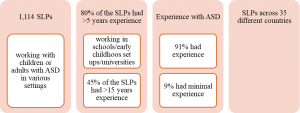
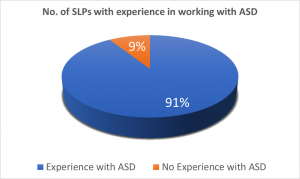


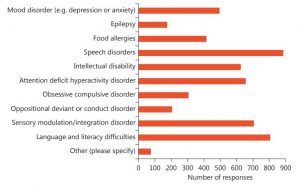
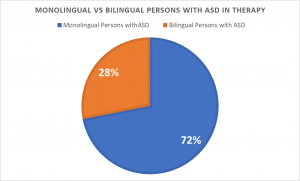

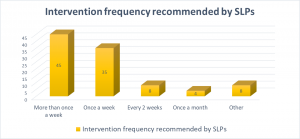


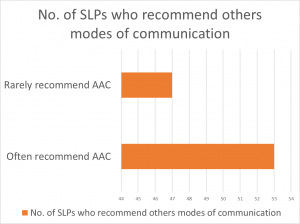
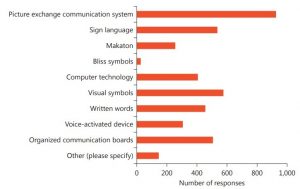
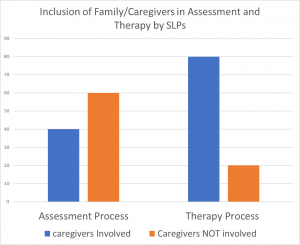
Leave a Comment
(0 Comments)